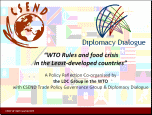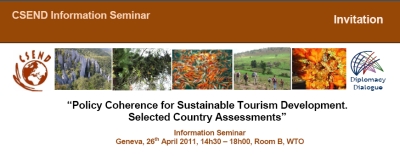TPG - categorys
A debate has sprung up on the Internet among economists and social scientists tracking the India story involving Jagdish Bhagwati , Amartya Sen, Martin Wolf and many others. The basic question is: Should India continued to focus exclusively on high growth or should it invest more in social programmes as well. In regard to development strategy, should trade and economic policy have the upper hand over social and political policy- or a mix of both with different time frames and priorities. At issue are the need to reduce high levels of poverty and equally high level of inequality.
Capstone 2010: Trade and Investment for developmen, here
Trade in Health services is part of the GATS/WTO service agreement. What follows describes health services in the context of offensive and defensive health service interest that countries might have.
GATS Financial Services Liberalization: How do OECD Members Schedules Impact Commercial Banking FDI?
Recent efforts to lay out an international regulatory framework relevant for fi nancial services liberalization, consolidated under the aegis of the World Trade Organization (WTO) and followed by the implementation of the General Agreement on Trade in Services (GATS), have provided market access to commercial banks seeking establishment in an important group of countries.
Regional Trade Agreements and Foreign Direct Investment: Impact of existing RTAs on FDI and trade flows in the Andean Community and implications of a hemispheric RTA in the Americas.
Hardly a day goes by without the media reporting on the difficult negotiations w i t h i n t h e Wo r l d Trade Organization (WTO) and the threat to international trade should there be no successful conclusion to the Doha Round.
The problem most often reported centers around market access for agricultural products from developing countries that cannot pass the prohibitively high level of tariffs of the industrialized countries.
This policy brief argues that, all too often, the Fund’s use of “conditionalities” for lending has stepped beyond its core legal mandate, particularly causing harm to the least developed countries’ economic development, for example by dictating their trade policies.
Technical Assistance to Least-Developed Countries in the Context of the Doha Development Round: High Risk of Failure
Summary Report of Book Vernissage “Inter-Ministerial Coordination and Stakeholder Consultation of Trade Policy Making” - 19th July, 2010 in Room C, WTO
CSEND-CUTS Book Vernissage 19th July 2010, WTO, Geneva “Inter-ministerial Coordination and Stakeholder Consultation of Trade Policy Making
![]() This joint panel between CSEND and CUTS offers key insights into how countries can improve their trade policy governance. Both are research and development NGOs and have conducted research, capacity building and networking projects in Africa, Asia and Latin America. The two organisations will present findings of their recent research on trade policy making processes and role of relevant stakeholders. They will also offer solution sets to participants interested in how trade policy governance can be organised in a more efficient, inclusive and effective manner.
This joint panel between CSEND and CUTS offers key insights into how countries can improve their trade policy governance. Both are research and development NGOs and have conducted research, capacity building and networking projects in Africa, Asia and Latin America. The two organisations will present findings of their recent research on trade policy making processes and role of relevant stakeholders. They will also offer solution sets to participants interested in how trade policy governance can be organised in a more efficient, inclusive and effective manner.
 CSEND has organized an international conference on the Food Crisis together with the group of the Least Developed Country members of the WTO. The title of the conference was“ WTO Rules and Food Crisis in the Least Developed Countries” . The conference took place on 17th July at the Geneva Centre for Security Policy in Geneva. The working programme including presentations and related documents are available here.”
CSEND has organized an international conference on the Food Crisis together with the group of the Least Developed Country members of the WTO. The title of the conference was“ WTO Rules and Food Crisis in the Least Developed Countries” . The conference took place on 17th July at the Geneva Centre for Security Policy in Geneva. The working programme including presentations and related documents are available here.”
Place: Geneva Centre for Security Policy
Programme click ![]() here
here
![]() The Financing for Development Office of the United Nations recently published an excerpt of Prof. Raymond Saner's ground breaking article on "The International Monetary Fund's Influence on Trade Policy: A Legal Critique" in its Newsletter, The Road to DOHA (link). The original article was published in the Journal of World Trade, 41(5): 931-981, 2007.
The Financing for Development Office of the United Nations recently published an excerpt of Prof. Raymond Saner's ground breaking article on "The International Monetary Fund's Influence on Trade Policy: A Legal Critique" in its Newsletter, The Road to DOHA (link). The original article was published in the Journal of World Trade, 41(5): 931-981, 2007.
This paper focuses on the function of Inter-ministerial Policy Coordination (IMPC) and its critical role in governance. Following a definitional section, the authors give an overview of public sector governance in Eastern & Central Europe and Central Asia and then discuss the application of governance principles to Inter-ministerial Policy Coordination in these regions. They conclude with specific examples from the Republic of Macedonia and Central_Asia.
